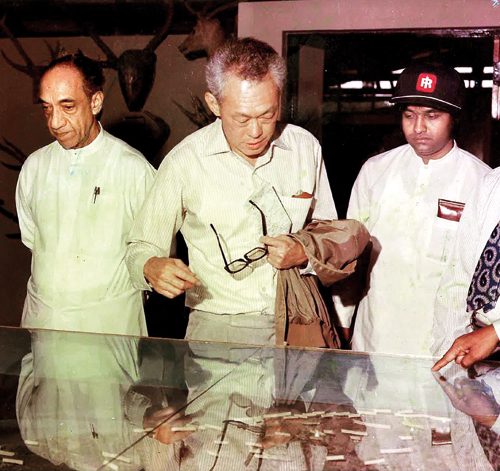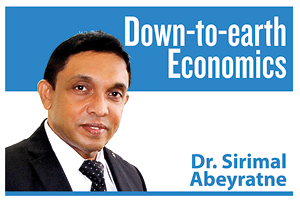Dilapidated bungalow
View(s):
File picture (from the Internet) of the late Singapore PM Lee Kuan Yew during his visit to Sri Lanka.
Some of my friends raised their eyebrows after reading what appeared in this column in the past few weeks. Sri Lanka is not a business-friendly country with its lack of “economic freedom” and not among the “innovative” nations in the world; neither is Sri Lanka a “happy” nation in the world.
All what I wrote was based on international data reports. I used indices comparing countries which appeared in three such reports – Economic Freedom Index, Global Happiness Index, and Global Innovation Index. In fact, I have much more to write from many other international data reports, which are freely available nowadays. And thanks to the rapid growth of information and communication technology, all these reports are now freely available in the Internet. Most of the international organisations such as the World Bank and the IMF, UN agencies and many others have opened their user-friendly databases free of charge.
In effect, information is not a secret anymore; it is free, open and efficiently transmitted throughout the world. Information is transparent and competitive too. Perhaps, it is Sri Lanka which is not yet ready to provide user-friendly data to the public, while some of the government agencies still want us to pay for their data or go through lengthy bureaucratic channels to get access to data.
The major concern of my friends was that “it cannot be that bad; see our achievements from our free health care and free education policies; and our human development standards”. Let me take you through an interesting discussion out of which we can give a reasonable insight into this sentiment.
“The Lodge” in Nuwara Eliya
The late Prime Minister of Singapore, Lee Kuan Yew, once wrote about his trip to Nuwara Eliya, when he was spending time in Sri Lanka: “In Nuwara Eliya, I stayed at the former British governor’s hill residence, ‘The Lodge’. It was dilapidated. Once upon a time it must have been well-maintained, with roses (still some left) in the garden that looked like an English woodland.” I am not quoting anecdotes, but Lee Kuan Yew’s own words in his famous book “From Third World to First – The Singapore Story 1965-2000”. His few words about “The Lodge” tell us a big story on the post-independent development misfortune of Sri Lanka. In fact, before explaining his trip to Nuwara Eliya, Lee Kuan Yew himself wrote a prelude to his journey: “It was a most instructive lesson on what had happened (in Sri Lanka) after independence.”
It is not surprising that many Sri Lankans used to say that “at that time among Asian countries, Sri Lanka was second only to Japan”. Even though, this is more rhetoric than fact, there is some value in the statement. And if you go back further down history about 120 years to the turn of the 20th Century, Sri Lanka’s GDP per capita was not much different from Japan. In fact, not many countries in Asia could provide necessary information to the Maddison Research Project of the Groningen Growth and Development Centre of the Groningen University where such historical data has been compiled and projected.
First episode
The initial favourable economic conditions that Sri Lanka inherited from its colonial past were the underlying factor which provided the necessary resources to expand our welfare state including free health care, free education, and subsidies on essential consumer goods and services. In all such areas, Sri Lanka was among the highest nations in Asia, only because we had an inheritance from the past.
Therefore, we surprised the world and achieved best standards among developing countries in terms of our health care, education, and human development; but it was obviously without improving productive incomes and productive jobs of the country, in order to generate adequate resources to maintain what we inherited from the past.
Second episode
Leaders were thrilled during “good times”, while the good times were determined by good prices in the world market as well as good weather conditions in the country; they increased spending from the resources that came from haphazard incidences. Then, equally important is that there were “bad times” too; the leaders worried about how to maintain what they have initiated, and of course, such initiatives cannot be reversed now.
 The only alternative was borrowing; so we initiated borrowings. When you put both your meagre savings and borrowings into the same till, you can’t separate them and say that it is our generated money for recurrent spending and that is our borrowed money for public investment. In fact, most of our public investment including the government’s infrastructure projects was financed by borrowed money. And maintaining the welfare state increasingly became a laborious exercise for all governments. When it is the unavoidable responsibility of the governments, naturally our concern is to maintain it even at its minimum levels by tapping the resources and scratching the bottom of the barrel.
The only alternative was borrowing; so we initiated borrowings. When you put both your meagre savings and borrowings into the same till, you can’t separate them and say that it is our generated money for recurrent spending and that is our borrowed money for public investment. In fact, most of our public investment including the government’s infrastructure projects was financed by borrowed money. And maintaining the welfare state increasingly became a laborious exercise for all governments. When it is the unavoidable responsibility of the governments, naturally our concern is to maintain it even at its minimum levels by tapping the resources and scratching the bottom of the barrel.
Third episode
Now we have come to the third episode of our story, where there is nothing left in the bottom of the barrel. Besides, we see a multi-faceted and deep-rooted issue. The most disturbing issue that has emerged in the recent past is that we continued to borrow, and our borrowings were on par with our debt obligations. This means that we need to borrow even to pay debt. As I said earlier, the information nowadays is free and open and has no boundaries so that Sri Lanka’s debt problem is no more a secret in the world. Well, we can dispute and argue with reporting agencies, but it does not help the country to get out of this problem. And finally, we are faced with the COVID-19 issue at a time when our economy was like a person with a weak immune system and chronic illnesses, with no resources at hand.
Throughout our development history, many other nations in Asia which were “behind” Sri Lanka at that time have surpassed us not only in generating resources for people, but also in achieving better health care, education, and human development standards. The progress in the world in the areas of health and education cannot be matched with what we here in Sri Lanka had maintained throughout history. The initial success of Singapore, South Korea, Taiwan and Hong Kong were followed by many other East Asian and Southeast Asian countries in our neighbourhood. Even today, there are a couple of forerunners faster than Sri Lanka and they might include India, Bangladesh, Vietnam, Thailand and Myanmar.
New development indicator
To say the least, many of our leaders don’t believe in the “development” that we have achieved as a nation, leave aside others which include bureaucrats and businessmen. This is a proxy for measuring our development standards: They keep their families in the US, the UK, Australia and Canada. They educate their children in these countries, and not in our free education system. They go to these countries for health care, leaving our free health care behind. If we don’t practice what we preach, how can we trust what we have achieved? It is like a “dilapidated old bungalow” that we managed to keep from falling apart.
You might ask a question here: “How was it possible for many of our neighbouring countries to achieve what they have achieved today, even by eroding and surpassing Sri Lanka’s initial advantage?” My answer is very short: It is the vision and the integrity of those leaders. At times where the leaders failed in their vision and integrity, the progress of some of these nations slowed down too.
By the way, after reading my column on “Sri Lankans, are you happy?” on October 25, one of my readers wrote back raising his concern: “I am keen to know the gross national happiness ranking of Canada and Australia, because my children are living there.” He was worried about the children and he missed them. I sent a short reply to him: “They are happy nations occupying 11th and 12th ranking positions so that you can be happy too”. He replied with relief: “Thank you.”
(The writer is a Professor of Economics at the University of Colombo and can be reached at sirimal@econ.cmb.ac.lk and follow on Twitter @SirimalAshoka).


